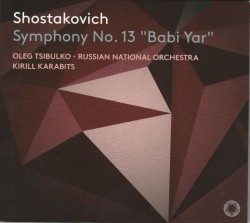 Shostakovich – Symphony No.13 “Babi Yar”
Shostakovich – Symphony No.13 “Babi Yar”
Oleg Tsibulko; Russian National Orchestra; Kirill Karabits
PentaTone PTC 5186 618 (naxosdirect.com)
In the absence of a memorial marking the scene of one of the many great atrocities committed by the Nazis in WWII, Dmitri Shostakovich erected his Symphony No.13, “Babi Yar” (1962). Initially, Shostakovich set only the title poem by his younger compatriot Yevgeny Yevtushenko. Later, he encouraged the poet to provide more, ending up with a total of five movements, all of them choral settings.
This is post-Stalin Shostakovich, a time when the composer allowed his musical utterances to be “modern,” encouraged by the “Khrushchev Thaw.” His choice to set a poem that more or less accuses his compatriots of anti-Semitism was nonetheless full of personal risk, given how poorly the poem had been received by critics and the Russian public. Disturbing echoes can be found when one reads the text in today’s context, as nationalists again repeat the phrases that disguise hate. The music that accompanies the part of the text echoing Anne Frank’s diary is heartrending.
On this recording the chorus, orchestra and soloist are uniformly excellent. Oleg Tsibulko has the classic Russian basso voice, warm and powerful. The recording was made in a studio, but one hears a reverberant hall. At times overbearing, as one might expect given the subject matter, there are lighter moments. The second movement, for example: Humour is a celebration of how mirth and mockery always triumph over tyranny; it’s a scherzo where Shostakovich pulls out all his favourite tricks.
The text of the other poems veers between subversion and sloganeering, treading a line between orthodoxy and rebellion. The most interesting is the final poem, A Career. Its ambiguity is matched quite cleverly to the most tonal and tuneful music in the symphony. Trust Shostakovich to loose the arrows of irony toward an unsuspecting target.



